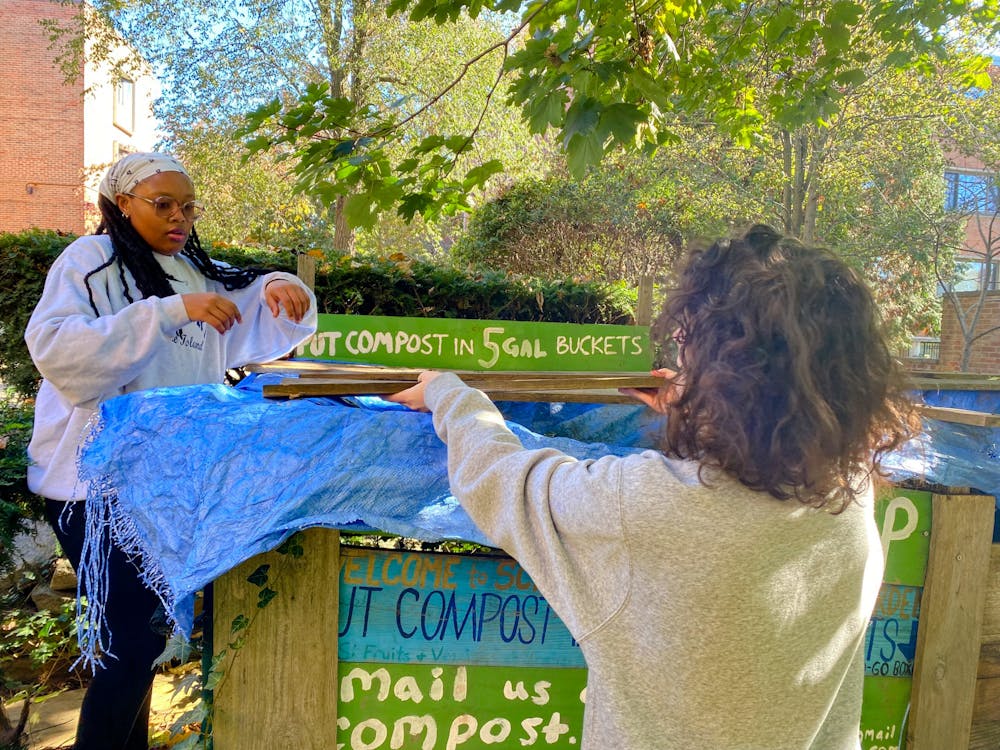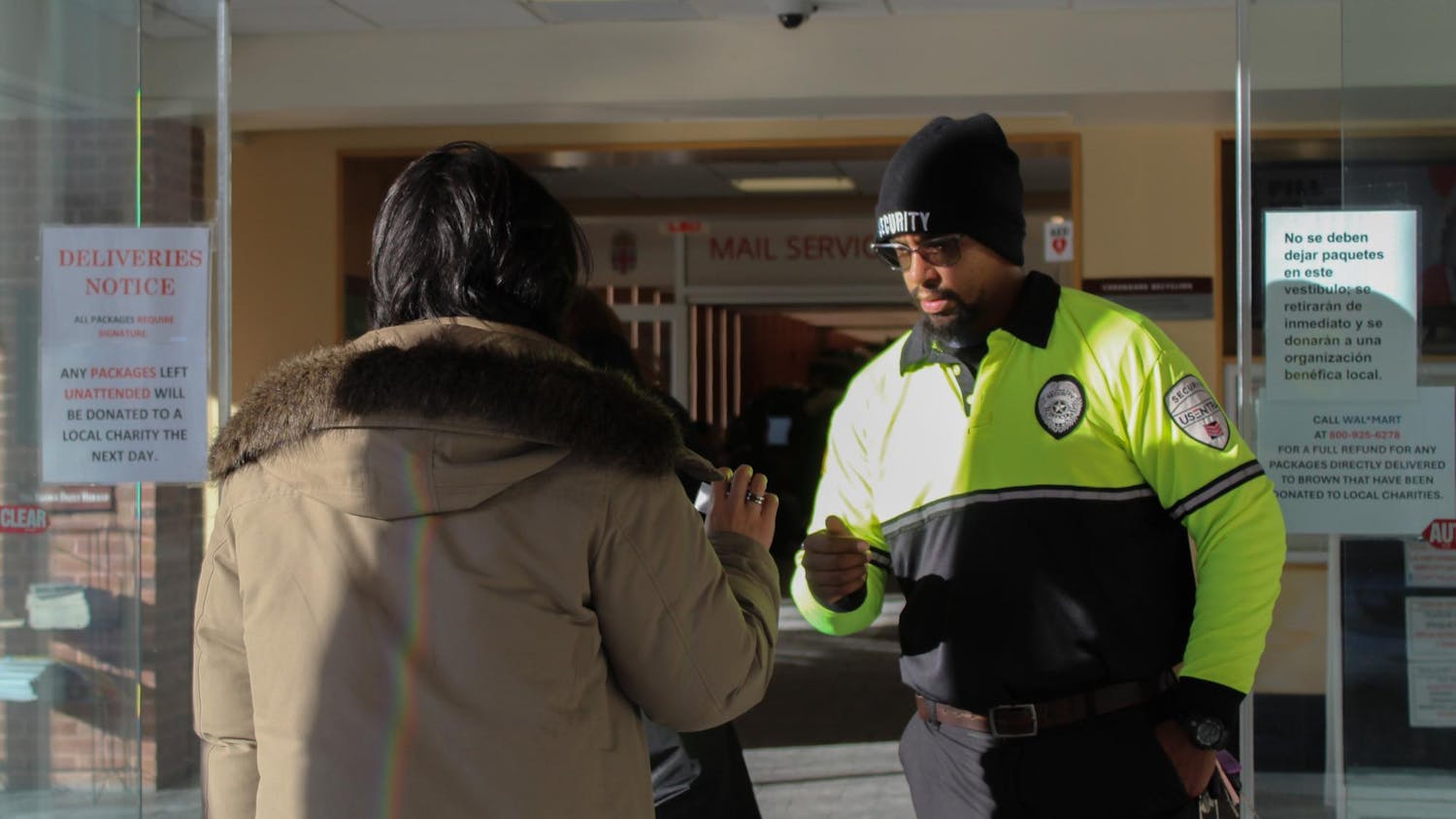In recent years, the University has announced a series of policies concerning its relationship with the environment and addressing climate change. In 2019, the University committed to cutting campus greenhouse gas emissions to net-zero by 2040, and a year later pledged to halt investments in fossil fuel extraction. In 2021, it released a Sustainability Strategic Plan outlining the path to net-zero emissions.
As Brown moves forward with its broader climate policies, The Herald spoke to three environmentally-focused student groups on campus about their daily advocacy and the often-overlooked ways institutions can foster sustainability.
SCRAP: Looking beyond composting
At the student garden outside of Perkins Hall, Abbie Macher ’23 and Jadyn Ligoo ’25 worked through the composting process. They are both members of SCRAP, Brown’s student composting group. In front of decorated wooden bins, they explained the many stages compost must go through before it is ready for use. “It's a months-long activity,” Ligoo said.
First, they explained, food remains must be mixed in with leaves. Only when the contents start to break down into smaller bits are they ready to be sifted in a second container, Ligoo said. After more waiting, the compost must be sifted once more before going into a third bin, where “anyone is welcome to come and use it,” Macher said. “And we give cute little buckets,” Ligoo added.
Ligoo tied her interest in joining SCRAP to her family's “successful and failed” attempts at composting. “We had monkeys where we lived, so that didn't work so well,” she said, explaining that the animals would break into their bins.
Macher said previous experiences with composting in her home state of Maryland inspired her involvement with SCRAP. “On trash day, a composting company comes and picks up your compost … and you will get bags” of the final product, she said, referencing the process where she grew up. “I wanted to see the in-between steps.”
Still, Ligoo said she thinks that composting should be a University-wide responsibility.
“If you are on meal plans, for example, it's easier because it's done for you,” she said, referring to how Brown Dining Services composts food scraps and back-of-house items, which are from kitchens and prep areas. “Taking the burden (off) of the students makes it easier for Brown to centralize how they compost."
While Macher agreed, she also highlighted the University’s lack of transparency about its compost system for all dining halls. “They could definitely be clearer now about whether they are composting,” she said.
In an email to The Herald, Jessica Berry, director of the Office of Sustainability, wrote that information on the destination of the University’s food waste can be accessed through the office's website.
For Macher, it's also important to consider the amount of non-food waste students produce annually. “As people are moving in and out of dorms, … they have full dumpsters on greens to handle waste, which is a little gross and upsetting to see,” she said.
Macher pointed out that in these situations, students have a responsibility to manage their own waste, regardless of the University’s policies. “The life of a college student is just a lot of consumption,” she said, adding that “the best way to deal with waste is just not to create it,” and there is only so much the University can do to control how much its students consume.
Macher said that while there are many ways Brown can become greener, current University policies are more progressive than those at some other institutions. “I know of other colleges and I don't think that they compost. … It's not a widespread practice,” she said.
Macher and Ligoo put their tools away and prepared to leave the garden. "I'm gonna live to see the planet burning, but SCRAP makes me feel a little better," Ligoo said, while waving goodbye.
SLUG: A relationship to land
According to Maru Attwood ’24, Students Learning Urban Gardening occupies a “small pocket of the student garden.” While SLUG’s purpose is primarily recreational, Attwood highlighted the group’s broader interest in sharing knowledge about the natural world and fostering meaningful relationships with food.
Though the sun was already setting, El Hebert ’24 joined Attwood at the student garden to help decorate a land acknowledgement sign. “Brown University is a settler institution. We live on land that was never forfeited by its original owners … so this sign has some information about how we want to establish that as a visible part of our relationship with the land here,” Hebert said.
Both Hebert and Attwood joined SLUG as first-years in 2020 in the height of the COVID-19 pandemic. “I would come out … and see the garden growing and filled with so many colors and flowers and gorgeous-looking produce. It would be the highlight of my day every time,” said Hebert, holding a paintbrush in one hand and a lantern in the other.
Speaking about ways to improve composting on campus, Attwood highlighted concerns about implementing front-of-house composting in Andrews Dining Hall because of potential contamination from plastic containers.
According to Berry, Andrews uses a “back-of-house” composting system. She also noted that the plastic containers are “currently under review for ways to reduce the disposable packaging.”
Like Macher and Ligoo, Attwood highlighted how a culture of consumption impacts the University’s waste system. “The ways the dining halls incentivize you to take lots of food and then throw it all away is a huge problem,” she said.
Attwood and Hebert’s motivations for participating in SLUG are both personal and collective. While they recognize that individual action has its limitations, it is also a natural extension of their worldviews.
“Individual action is not going to cause Andrews to put up a (front-of-house) composting bin that works, but what it can do is give people a model to change their imagination, … to make it feel like something within reach,” Hebert said.
“I don't feel at home in a place unless I'm growing something in it, so SLUG is very important to me,” Attwood said.
West House: Communities of care
Hannah Saiger ’25 sat on West House’s porch as she explained its history. “It used to be a boarding house … specifically for commuter students” at Pembroke College, she said. In 1985, Brown’s housing council approved student requests to designate West House as an Environmental Program House.
According to Saiger, the house’s mission is flexible, changing to accommodate the interests of its residents. “In general, we try to source our food as sustainably as possible and create a diverse community of people living together that support each other.”
West House is one of the University's two program houses dedicated to environmentalism. Selected students are committed to reducing their environmental impact by sustainably sourcing their food and living collaboratively. Residents are assigned house jobs and hold weekly meetings.
Saiger decided to apply for West House after a gap year. “I also felt very sad living in a dorm. … I think it's pretty unnatural … to not have any family structure,” she said, noting that she has found a greater sense of connection in West House.
For Saiger, care for the community and care for the environment are one and the same. “I love coming home and there are people in the living room hanging out or cooking or playing a game,” she said.
While speaking to The Herald, Saiger was interrupted frequently as people came in and out of the West House. Saiger greeted each person with brief conversation before returning to the questions.
“At college, it is easy to feel disconnected from the environment, and (West House) has helped me reconnect,” she said.
When asked about the University’s environmental policies, Saiger highlighted that the most powerful changes can come from the student body’s demands. “As students we have the power to make (the University) care,” she said.
Saiger said the University has an institutional responsibility to make its campus more sustainable because of the amount of resources — land, food and energy — it consumes in Rhode Island. But for her, it is important that University policies are informed by the work that students in organizations like SLUG, SCRAP and West House have been doing for years.

Julia Vaz was the managing editor of newsroom and vice president on The Herald's 134th Editorial Board. Previously, she covered environment and crime & justice as a Metro editor. A concentrator in political science and modern culture and media, she loves watching Twilight (as a comedy) and casually dropping the fact she is from Brazil.





